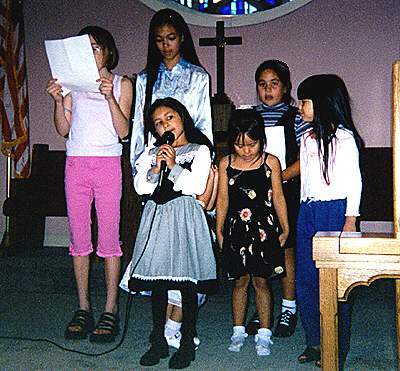General Board of Global Ministries
![]()
UM Information
UM
Reporter
![]()
Florida Southern College
![]()
Bethune
Cookman College
![]()
FL UM Children's Home
![]()
|
|
Melbourne starts first Filipino mission |
 |
Photo courtesy of the Rev. Sol Madlambayan |
| The children's choir performs during worship at the first Filipino mission in the Florida Conference. The mission faces the challenge of uniting 90 different Filipino dialects and cultures and several generations of people who have different levels of assimilation into American culture, according to Melbourne District Superintendent Anne Burkholder. |
| By Michael Wacht MELBOURNE — The Filipino people became the newest members of the Florida Conference when First United Methodist Church here opened its doors to the conference’s first Filipino United Methodist congregation. The Rev. Sol Madlambayan, an elder in the West Middle Philippines Annual Conference, is the pastor of the congregation, which now has 30 members and as many as 70 people in attendance on Sunday. Madlambayan said he "felt the urgency to start a Filipino mission" two years ago when he attended a Billy Graham School of Evangelism. A year later, he filed for leave from his conference, and his wife, Myrna, quit her job as an accountant. The two moved to Melbourne where Madlambayan’s sister and brother-in-law, Ruth and Curtis Splain, and mother live. The Rev. Brice Harris, senior pastor of the Melbourne church, said having the Splain family in the church helped the process of starting the mission. "The Splain family has high credibility in the church, and we know who the Madlambayans are, so we believe things will work," Harris said. "We feel confident there is no risk here because the Madlambayans are so deeply committed to the United Methodist Church and Jesus Christ." Harris said the church’s board voted "unanimously and enthusiastically" to sponsor the mission by providing it with a place to worship and fellowship. The Melbourne District Board of Mission and Church Extension allows the mission to operate under its not-for-profit certificate. Harris said the church and mission had to decide whether the mission would be a program of the church, combining their finances and memberships, or an autonomous ministry housed in the church, but maintaining its own records. "Most likely it will be an autonomous ministry with its own finances and maintaining its own membership records," he said. "That way when it grows and moves into its own facility, there will be no transition from our books to theirs. Our dream is that it will grow to be one that can maintain its own facilities and grow to become a charter church." Madlambayan agrees. "We are starting a Filipino mission that in the long-term…will be self-sustaining," he said. "We are preparing ourselves…through massive evangelism, Bible studies and more prayers for this mission." Part of that evangelistic effort is a Seafarers Ministry that offers fellowship, translation and transportation to more then 5,000 Filipino sailors who sail into Port Canaveral. The Rev. Anne Burkholder, superintendent of the Melbourne District, said she is pleased with how easily the mission has begun. "It’s one of those situations that fell into place so well you know it has to be a God thing," she said, adding a major reason is the "historic connection" among United Methodist conferences. Since the Philippines and United States use the same Book of Discipline, Madlambayan knows how to operate within the United Methodist Church, she said. The mission has received a three-year grant from the conference Committee on New Church Development and Church Redevelopment and money from the district’s Providers, formerly the Builders’ Club. It has also applied for an Ethnic Local Church Concerns grant from the General Board of Global Ministries to purchase a van. Burkholder said she is excited the district is now ministering to the nearly 3,000 Filipino drawn to the area by Patrick Air Force Base and Florida Institute of Technology. She said the community does present challenges in ministry, though, since the Filipinos speak 90 different dialects, many of the families are cross-cultural and most include several generations of Filipinos who have various levels of fluency in English. Madlambayan says the 90 dialects come from different regions, each with its own culture. The church worships in the main dialect, Tagalo, and sings primarily in English and the Pampango dialect. Each Sunday, they also sing one hymn in a third dialect. "We’ve found it difficult to start a mission among the Filipinos and settle the regional differences, but we are laying the foundation on God’s word and more commitment to prayer so we will progress in this mission," Madlambayan said. Top
of this page |
